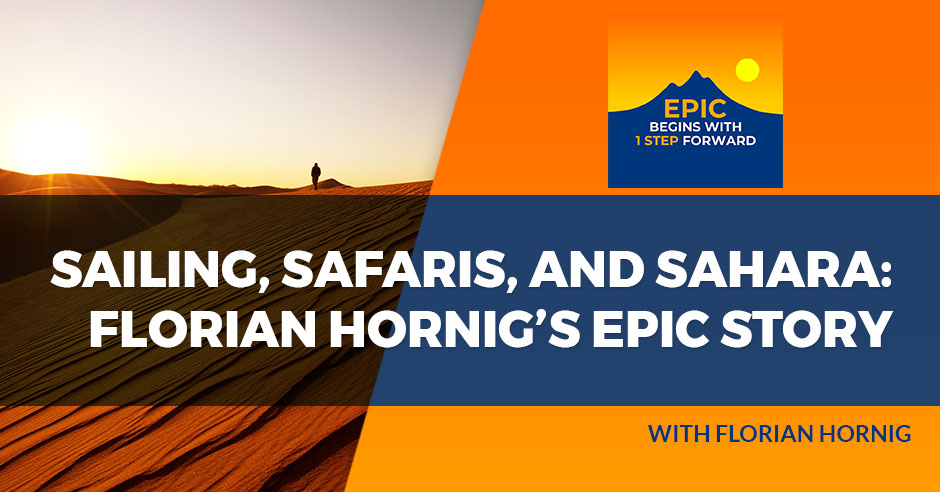What if you lived a life full of epic adventures, chasing the thrill of the unknown at every turn? That’s exactly what Florian Hornig has done, from solo treks across the Sahara to running safaris around Kilimanjaro and living on a sailing boat for years. In this episode, we dive deep into his incredible journey of exploring distant lands, surviving the harshest environments, and embracing a life of discovery. Join us as Florian shares his fascinating stories, including his unique experiences with Sailing Safaris and desert expeditions. If you’ve ever dreamed of venturing off the beaten path, this conversation is sure to inspire your next adventure.
—
Watch the episode here
Listen to the podcast here
Sailing, Safaris, And Sahara: Florian Hornig’s Epic Story
Welcome back to another exciting episode of EPIC Begins with One Step Forward. I’m your host, Zander Sprague, and I am so honored to be joined by Florian Hornig. Flo, tell us who you are and what you do.
Florian’s Journey: From Sahara Treks To Sailing
First of all, thanks for having me on the show. As you might be able to tell by my accent, I am not American. I’m German, and I think this is the first podcast I’ve recorded in fifteen years where I’m also in Germany because normally I’m traveling. I have been traveling with my camper back then. I did solo tours in the Sahara, I moved to Africa, I built a lodge in Zanzibar, I had a safari company on Kilimanjaro, and throughout all of that time, I have been coaching, mostly online-based.
After having spent quite some time in the Swiss mountains, I’m now living on my sailing boat for the last couple of years, and I’m on my girlfriend’s boat. That’s why I’m not in France, I’m not in Italy, but in northern Germany, and I’m really looking forward to being back in the south because I’m planning to leave this week. Germany, and then next week, France, sailing west towards Spain, and then Morocco, and then the Canary Islands for the winter.
That is so incredible, and I might even say epic, and clearly, you’ve been on quite a few epic adventures, and I want to talk about that. There are some things that you and I actually probably share in common, places that we may have been together, which is really exciting. First thing I want to talk to you about, you said you solo trekked across part of the Sahara Desert.
I too have been to the Sahara Desert many years ago, when I was probably about thirteen years old. I was in Morocco, and we went down to right on the edge of the Sahara. We were camping out in the Sahara, outside of a tinfoo and stuff. Where did you start in the Sahara? Where did you go?
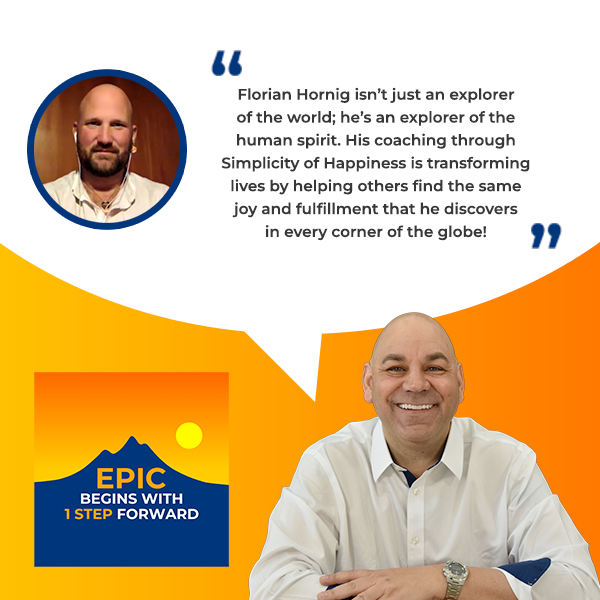
I’ve been to a couple of different places in the Moroccan desert. For anybody who’s not so familiar with Africa, Africa’s a continent.
It is. It’s a great continent.
It’s looking like this. I have a very old coin here with the shape of the continent cut into it. If you look at a map, it’s the top left corner, the Mediterranean going into the Atlantic Ocean. That is basically Morocco. Morocco is a country with a super old and rich culture because it has been part of the Roman Empire, and then the most different emperors who had their personal kingdoms there. There was a time, roughly between 2005 and 2015, that I was traveling back and forth to Morocco quite a couple of times. I wanted to see the king’s cities and some of the culture, but mainly I was driven through or over the mountains, and I checked the desert at a couple of different places.
At some point, in 2012, I had the idea to do a solo tour, and I wanted to go on an adventure. I was really bored by my office job. In 2012, I was 31 years old, and from 21 to 31, I thought I had to become rich and famous and work in an office and basically go to bed in my suit and tie on and look very important and bored on a plane a couple of times a week to travel to some very business, very important business meetings. One day I’ll be rich and famous. One day people will say, “You made it.” I’m allowed to just be crazy and travel the world, and then an epiphany hit me, and I realized, do I really want to be old before I live my dreams? Do I really need to get permission from other people, or can I just go for it?
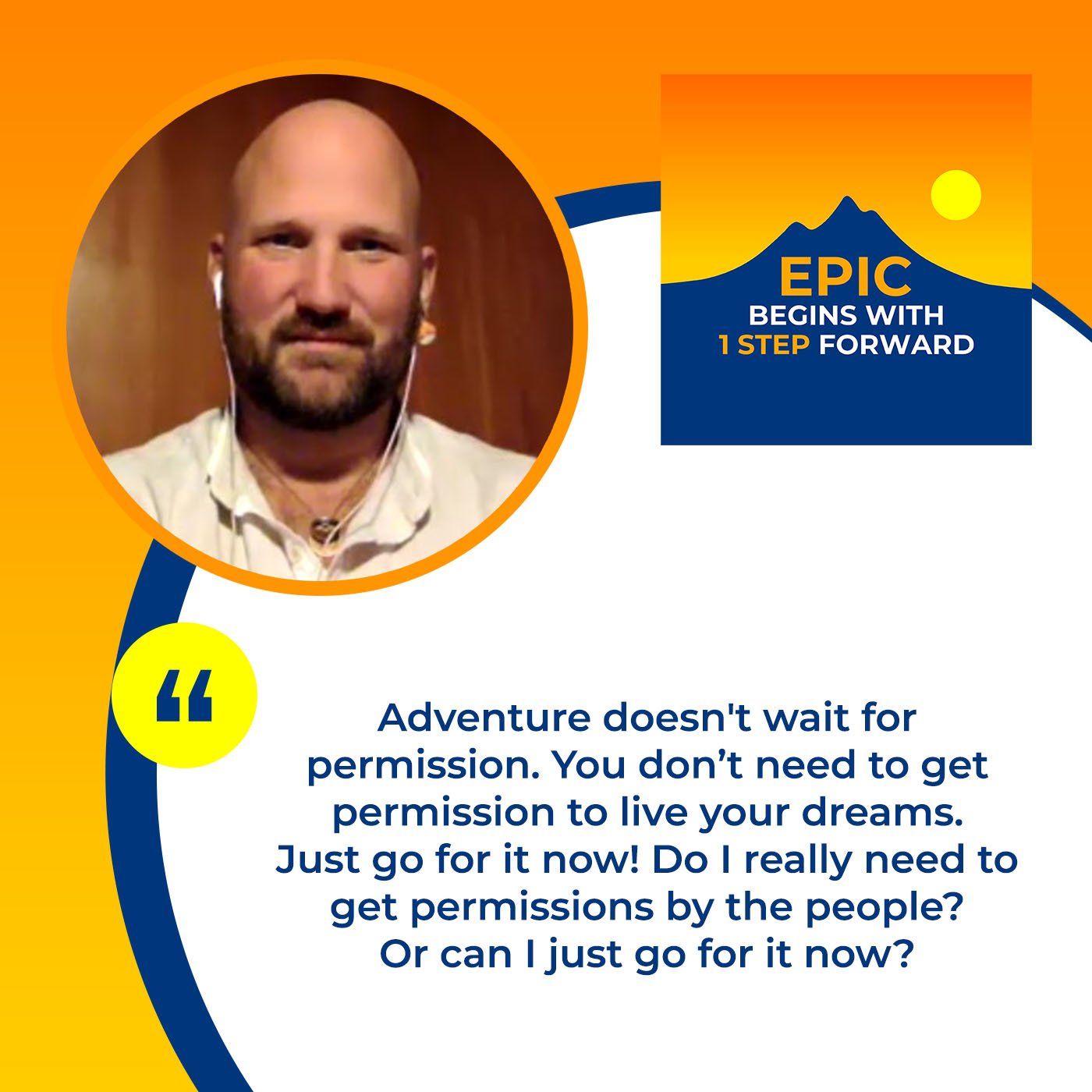
I wanted to try it out, and then I figured out I’m super afraid of going on my own adventure. One summer, I was just pinning down things that I really wanted to do: going through the Great Lakes in America with a canoe, going by horse through the Rocky Mountains, just stuff like that. One, sailing around the world in a sailboat. There was one thing that hit me, and that was to do a solo tour in the desert. I found out that there is a race called Marathon du Sable, and they do that in the southern part of Morocco in a place called Mamit. It’s called the Plain of the Gazelles. I thought, if they do a marathon, it was a seven-stage marathon there, and they looked roughly at the route that they took the previous years.
They had just moved it to a different place in Morocco called Merzouga. I thought, they did it there before, so why not just do that on my own? I’d never been to that specific place in Morocco. I just trained for that, and I got my backpack on, and I traveled to Agadir, boarded an Overland bus, and it took me about two days to arrive there. I asked the people which direction was the next town, and they all called me a bit crazy, and then I left. There’s a river that had a lot of water about four weeks ago, but normally it’s dried up, and it’s called the River Dra, and it’s a very long stretch. It is more or less the border between Morocco and Algeria to the south.
I was close to where you were, because I was close to the Algerian border. There were some border disputes when I was there.
They always have border disputes.
We were supposed to go someplace, and then they’re like, we’re all loaded up. There were a bunch of school-age children and adults, and we’re supposed to go down, and they’re like, we get about halfway down there, and they stop us and go, we can’t allow you to go there. There’s this border dispute with Algeria, and we don’t want a bunch of basically American young adults and adults getting messed up with that. They turned us around, we went back to where we were. I don’t know exactly, but I was in that same sort of area of the Sahara.
If you want to go there, you can travel there either from a coastal town called Agadir, or you can go there from one of the old capitals called Marrakesh, and from Marrakesh, you have to go over the High Atlas Mountain. Then you are coming to a place called Wazirzad, and like Ben Hur and a lot of these big American movies that are playing in the desert or in ancient Rome, they’re actually filmed in Wazirzad. Then you’re passing through Wazirzad, and then you’re going through the Anti-Atlas, where there’s no tree anymore. It’s just rocks, and everything is red, and then you come to a desert city, basically. A couple of 10,000 people live there. It’s called Zagora.
I was in Zagora too.
Facing Challenges In The Sahara
Shortly behind Zagora, the River Draa is disappearing into the ground. Mamid is the last settlement, the last date plantation, and that’s where I left the taxi. Then I started to walk from there. There’s an old dried-up lake, which is now just covered in salt, and I wanted to hike for about ten days. About seven days later, I got really bloody feet, and I was completely stressed out. Some people picked me up, and then I drove through Western Sahara with them to the place where the River Draa is going into the Atlantic Ocean. There’s a very famous stretch. It’s called Plage Blanche. We have these huge white sand beaches, and the last thing there is the military outpost every once in a while.
Things about the Sahara that I remember. First of all, I wanted to ask you this, which is: I have a bag that I still have. I’ve had it for 40-plus years. There is still sand in there, even though I vacuumed it, cleaned it, whatever. One of the things that I found amazing was the sand in the Sahara is so soft. It’s so fine. Honestly, it’s silky compared to a beach or something.
You know what the difference is?
What?
On the one hand, the beach sand very often is stemming from a different source. Very often, it’s either shells or it is ground up. For example, if you want to construct something, very often you need beach sand. You can’t use the Sahara sand because the cement won’t work. One is the chemical composition, and the other one is that because it has traveled for millions of years with the wind, it is completely round, so the Sahara sand is not stacking. When you try to build something out of Sahara sand, it’s always compiling because the sand is so round.
One is it travels by wind, so only the very light sand even arrives there. It’s building the big dunes, and then it’s completely round. That is why if you try to climb a dune in the desert, it’s taking you forever because you will always sink, and that’s what gives the soft feeling. The sand isn’t soft. It’s as hard as other sand, but because it’s so round, it doesn’t attach to each other. It just gives away when you step on it.
The two other things, I’ll stay in the desert for a second, and then I’m going to go to the Atlas Fountain experience for a second. But the other thing was, and again, I was young, so I’ll say I knew, but I didn’t know, how quickly it goes from when it’s daylight and the sun is up. It goes from being hot. People tell you this, but until you experience it, it can go from like 90 degrees Fahrenheit to 60 in a matter of 20 minutes. When the sun goes down, all of a sudden, all the heat is gone. Also, you’re in shorts and a t-shirt, and all of a sudden, you’re like, it’s freezing. Did you experience that too?
Most of the times that I was there, I did not experience that because I was there in the late spring, almost in the summer. It was super-hot in the day and still warm in the night. For some reason, it was the hottest time anyway. If you have clouds or a sandstorm, then the heat can’t evaporate. You need the crystal-clear nights with cold air coming in from somewhere in the wintertime.
I’ve been there twice in the wintertime, but I wasn’t traveling there. I experienced that as soon as the sun is gone because there’s no vegetation, no buildings, nothing that is keeping it in the sand. Very often, it’s not totally warm. Sand is a very good insulator. If you dig a meter, then the sand is getting colder. This is like rock formation, which keeps heating you from the radiational heat, just like the super-hot sand about maybe an inch or so. That cools out very quickly, and then it’s getting cold.
It is. From my experience, we started off in Marrakesh, and we did a bus through the Atlas Mountains. What I remember is, and I don’t believe that this has changed, but again, it was many years ago, I was on a road that was big enough for maybe one small, subcompact car. I’m in a bus. There are these enormous supersized dump trucks going by. We’re on the outside. We’re so close to the edge. I can’t even see the edge of the road. I’m just looking down these long lines. There are cars upside down. You see the tires because it had driven off. I’m like, oh my gosh, so happy I wasn’t driving, but I’m like, I don’t know how we were getting by because there’s barely enough room for us.
I remember one time we were up there, and we came around the corner, and there was this older gentleman with a burrow or donkey. There’s like, it’s us or the man and the donkey. We didn’t hit him, but I don’t know how we got by him because we were so close to him. There was nothing. It dropped off like 200 meters down. I’m like, this poor guy, what are we doing? When you went through the Atlas Mountains, did you have that experience of like, I’m on a road that’s not big enough for us and another person, never mind a car or truck?
Yes, but it’s not exclusive to the Atlas Mountains. I experienced that all over Africa, and Tanzania has some really nice mountains as well. I was traveling in Ethiopia. As well, in Ethiopia, you have these mountains that are very often between 3,000 and 4,000 meters in altitude, and it just doesn’t change. It is somehow, it’s an African thing. I found it in Tanzania, the way they drive in Tanzania, because very often there they have these big cars because they need to have the off roads. I want to say all over Morocco, you have more tarmac roads, and the road system is, if you come from Europe to Morocco, it is a big difference, but if you go from Morocco to East Africa, the difference is the same or even bigger.
Aside from being to Morocco, I’ve been to Southern Africa, South Africa, Botswana, Zimbabwe, Zambia, and stuff, which is fabulous, and you’re right, some of the roads are OK.
Others are adventurous.
That’s a good way to put it, Flo. Good way. And I do love the African continent. I haven’t been to East Africa yet, but that’s one of my big things and my epic stuff. It’s not yet. Certainly, Tanzania and Kenya, that’s on my not yet. I’m going to get there. I just haven’t got there yet, and I think it’s really interesting you said that you ran a safari company around Kilimanjaro. Can you talk a little about that and what you did?
Florian’s Safari Company At Kilimanjaro
Yeah. Basically, I was organizing tours. Quite simple. I had a house there that we were renting out as a lodge style, more family lodge. Because I travel to a faraway country with a different background, a different culture, a different climate, then I don’t want to eat the same food and have the same style of housing, the same style of kitchen. I want to experience the exotic, what is different. Still, I do not want to sleep on the floor with insects. It happened to me in the Sahara Desert that I woke up one night because there was an ant, probably, and it crawled into my nose and was really deep in the nose, so I couldn’t reach it anymore, but I could feel it was moving around. That was really horrible. I don’t want to have that in my bed.
When I’m traveling, I’m looking for an authentic way of experiencing the culture and the land and the people without being ripped off and without being comforted like an alien. In Tanzania, I don’t find that very often. The tourism industry is a lot different in Kenya and a lot more professionalized. They opened up to Western countries much earlier, and you can find a lot of decent hotels that try to keep the typical safari look and the safari feeling. They give you a vibe of Africa when you’re there. In Tanzania, a lot of those places are still not developed at all. They have these huge menus, and whatever you point on, they don’t have it. It’s chicken, and the chicken doesn’t taste well.
Give me maybe just an option, dinner, yes or no, or meat or no meat, and then cook something which is as local as possible, but something that the people can really cook very well, which is really nice and that you can come back and say, I tasted a piece of Africa. That was my idea. I built, by accident, a hotel in Zanzibar.
By accident? Like, “Surprise, I built a hotel.”
Yeah, I was there on vacation, and I wanted to prove myself. That was the year after I went to the Moroccan desert. I traveled Tanzania for about three or four weeks, something like this, on vacation, and then I wanted to prove to myself that I can do my home-office-style working from anywhere in the world. I stayed in Stone Town in Zanzibar for another month, and I needed to get out of the city every once in a while. Then I met a person who was renting out, very locally, a room very close to the beach in southern Zanzibar. We became friends, and then he asked me if I could help him to build a second room and keep it with this interesting touch. We did that, and then every time I was gone, he started a new project.
In the end, we turned around this whole property, and then we had this lodge about 150 meters from the beach in southern Zanzibar. I stepped into hospitality by accident. I didn’t plan that, but once it was going that way, I decided to move there for a year and manage it over there. I tried to find exactly that style. Before, I could tell you that I liked something or that I didn’t like something, but I couldn’t express what it was, and all of a sudden, I had to ask myself, what is it that I want? This, what I told you about the food, for example, we did not offer a menu anymore.
Sometimes, the most rewarding journeys are the ones you never planned for.
There was dinner, yes or no. We always had fresh fish, the best fish, freshly caught. We accompanied this with a lot of veggies, and it was only dinner, yes or no. Then you could choose whether you wanted the fish or only the veggies. We didn’t serve it on the plate. We served it in big bowls in the middle of the table. We just had one long table, and all the guests had to sit together at one table and serve themselves. I added my staff members also to that table. They didn’t like this because they didn’t want to sit with the white people at the same table. I said, you have to mix with them and talk to them because this is what makes this place special, that they are not separated from you.
I asked the people to only put as much on their plate as they wanted to eat so that we could use the rest. That gave all my visitors a very familiar and very sustainable feeling. After I left Zanzibar, I had a big corruption issue going on there, and we can have an episode about this. In the end, I got arrested by the police, and everybody I knew and worked together with, including my partners, said they didn’t know who I was. They accused me of breaking into the lodge. Although they knew that I was paying them, they said they didn’t know who I was. The police wanted to lock me up, but then I had my papers, and they said the papers were fake. I’m just trying to steal their land, and that’s how I left Zanzibar.
I wanted to keep working in that field because the experience that I had with my visitors was so rewarding. It was not this quick and dirty, try-to-get-as-much-money-out-of-them-as-you-want, and then they move on. It was about taking them on little adventures, may it be in the mangroves or on the spice farms. Not this quick, try to get as much money, but explanation, tasting, sitting together, spending some time. They really liked to pay us for that, and they went home and told their friends. I got to have that on the mainland.
I’ve got a really good friend of mine who’s a safari guide, and he can give you whatever you want. You can go for everything, from doing a mobile safari camp, where you’re like, we’re just out in the middle of the veld, and like, we’ve been here for a day, we’re going to go off game-watching, and then we’re going to end up over here. It’s comfortable but certainly very authentic in terms of the food that you’re eating.
I totally have experienced and do enjoy that, don’t give me an option. Say what you’re having is fish or you’re having some impala stew or something. I think that is part of the fun, and that is how you really learn and experience the local culture, the local flavor. You may discover that you really like something that you weren’t sure you were ever going to try.
Safari Adventures: Combining Coaching And Travel
Even if you do not like it, I prefer to have been in a country and say, I like that, and I absolutely did not like that, because I tried it,not because I read about it in a book or because I don’t eat it because it’s African, but because I have been there. After I visited the desert, I organized Sahara tours for ten years with the friends that I met there. We traveled for like a week or ten days, and I combined that with coaching. I did my one-week coaching seminar while walking through the Sahara Desert. We mixed this up with the guides who were all sitting around the same fire.
People had to help set up the camp, and that created some community. They were basically cooking. We were baking bread in the sand. You make a super-hot fire on the sand, and then you shovel away some of the fire so that only the coal and the ashes are there. Then you put the bread there, and then you cover it with sand and the fire. In the end, you just brush off the sand, and you can eat it right from the fire. Stuff like this, here, you would say this is not hygienic, and people there loved it because it was super authentic. This is what I really love about these adventures, to share them with others, to create these experiences.
There is not enough time. Let me just say, there’s not enough time because I’m like, what are your favorite epic destinations? But because you have clearly traveled many places and had many adventures, we’d be here for another two hours.
I can tell you very clearly that I do not have that. I love it. I love to have scenic landscapes, like interesting weather. I don’t like it if it’s just gray and a little bit of rain. Either super cold and snow, like a snowstorm, or super sunny, super hot, super humid. Even to have a tropical rainburst is interesting. I think there is almost no place that doesn’t have its beauty. Very often, the less it is touched by humans, the more fascinating and beautiful it is.
I agree. I’ve been very fortunate to travel to many places in the world. Some of the ones that I remember best are the ones where there wasn’t a lot of meddling from us humans. That’s great. Question I love to ask all of my guests, you referenced it before, this not yet. What are one or two of your not yet, those things that you’re like, I want to do this, but it hasn’t happened yet? Either places that you’d like to travel to or experiences you’d like to have that are on your bucket list?
The thing that came to my mind first was the Amazon.
That would be fascinating. That sounds like that might be another couple of years for you to explore that.
Florian’s Future Goals: Amazon And Sailing The Atlantic
Originally, I wanted to cross the Atlantic Ocean with my own boat this winter. I’m not going to do that yet. That is something that’s on my bucket list as well. I have the idea that I travel to some places with my boat so that I don’t have to be there on vacation, but that I can stay there longer, stay at the arena, and explore the country, like having my home with me and traveling there slow and by wind. I think that’s also super interesting, that you’re not boarding a plane and getting off the plane. If you travel slow by walking, riding a bike, riding a horse, or going by the power of the wind, it gives you a feeling and understanding of distance, and you don’t have jet lag.
It’s not the destination, it’s the journey. Traveling slow by walking, biking, or sailing gives you a true feeling of the distance
That is true, absolutely, and certainly, sailing your boat to different locations is truly an epic adventure. As I say, it’s not the destination; it’s the journey there. I sailed for many years. I haven’t done too much long-distance cruising or whatever, sailing, but certainly very challenging because all kinds of things come up that, all of a sudden, you have to figure out how to fix whatever broke.
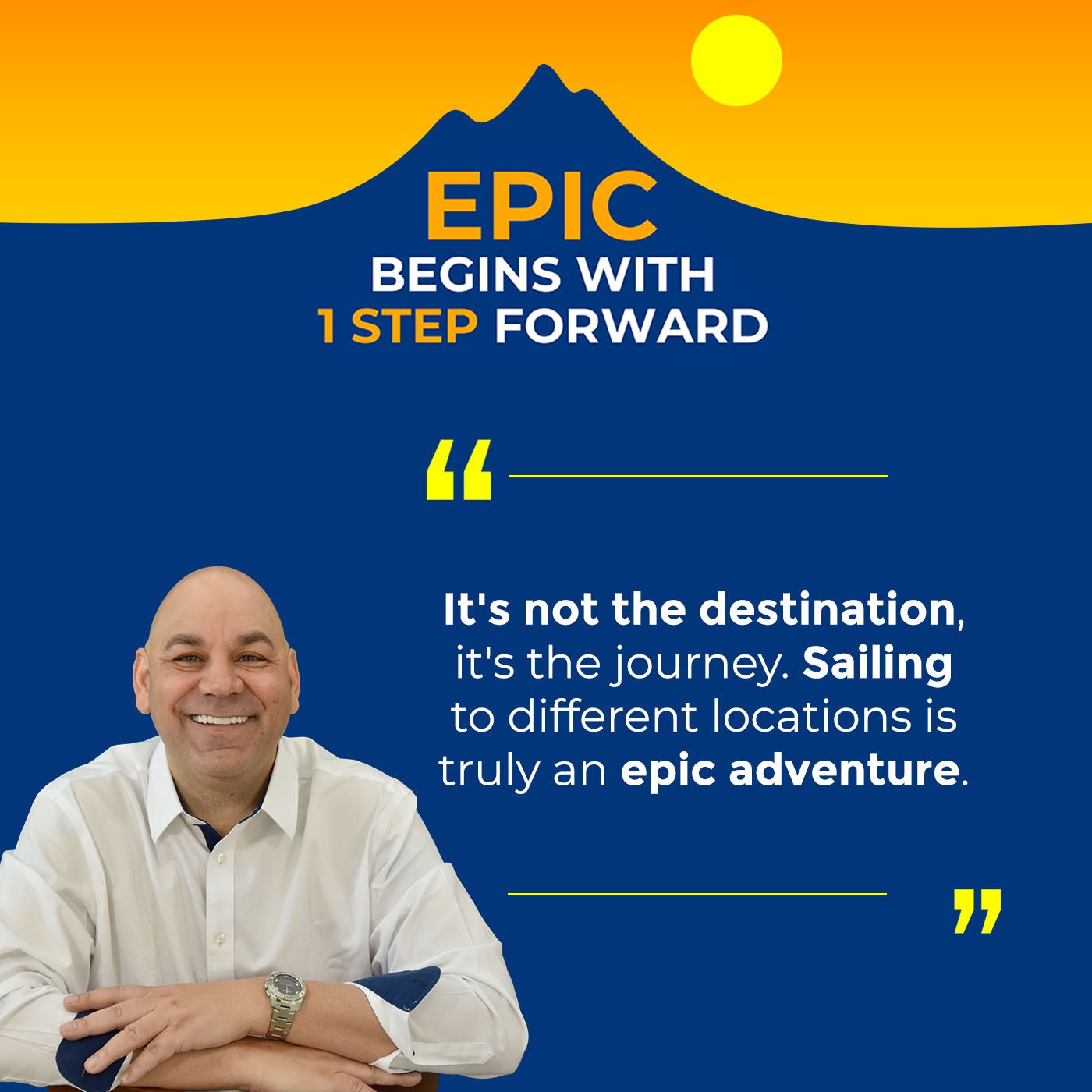
All of the time.
As beautiful as the world is, mother nature can sometimes be an unforgiving friend.
It never is your friend.
That is true.
It is always an arrangement. If, and very often so, it’s either I live or something else lives. It’s always a competition. If I’m not here, something else is there, be it the air, which is in that place that I just occupied, or if I’m leaving the water, the water fills right up. Nature is always moving and changing. Nature is not there to give me a good life or to protect me from anything.
Nature is always moving and changing. It’s not here to protect us, but to remind us that we are part of something greater.
Absolutely not.
Being a part of the system, that can lead to being thankful on the one hand, but always being conscious and careful on the other hand.
Flo, I want to thank you so much for sharing your adventures and your knowledge.
You’re welcome.
This has just been great. If people are interested in learning more about you, perhaps following some of your adventures, how can they get a hold of you?
Conclusion And Where To Follow Florian
The easiest is just to visit my travel website. It’s Flohjoe.com. Maybe you can link it? There are links to my videos. There’s a link to my coaching. It’s a good starting place.
Absolutely. I want to thank you so much for joining me. This has really been so much fun. I want to remind everyone that if you’re ready to begin your epic adventure, go to EpicBegins.com, and as always, remember, epic choices lead to the epic life that you want.
Important Links
About Florian Hornig
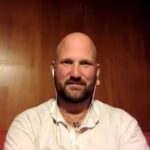 Florian is the founder of Simplicity Of Happiness, an inspirational coaching project that is helping customers to live the life they love. He is living an adventurous life and is taking his own inspirations from travel around the world. Between the mountains and the ocean, between Europe and Africa he is collecting stories and experiences to share with the word.
Florian is the founder of Simplicity Of Happiness, an inspirational coaching project that is helping customers to live the life they love. He is living an adventurous life and is taking his own inspirations from travel around the world. Between the mountains and the ocean, between Europe and Africa he is collecting stories and experiences to share with the word.

